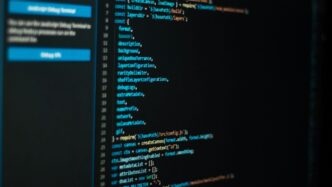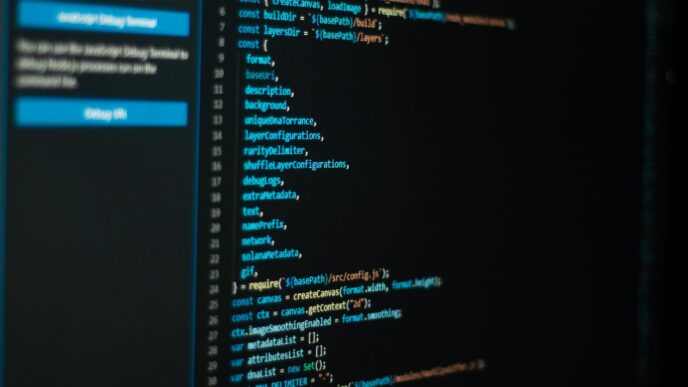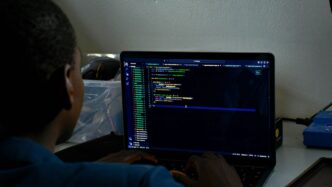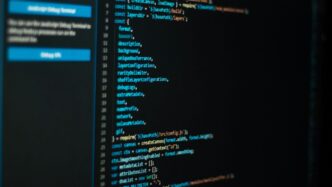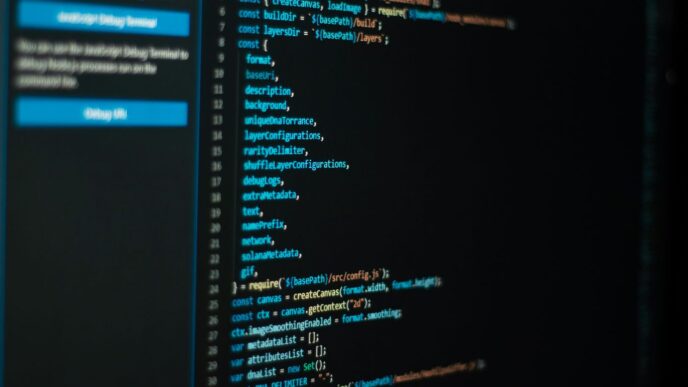Getting started in computer science can feel like a lot. There’s so much to learn, and knowing where to find good information is half the battle. This guide points you toward some helpful computer science articles for students, covering everything from the basics to more advanced topics. Think of it as a map to help you find your way through the vast world of computing.
Key Takeaways
- Focus on understanding the core programming languages and how they work.
- Learn about data structures and algorithms to organize and process information efficiently.
- Explore the basics of operating systems to see how computers manage tasks.
- Get familiar with database management systems for storing and retrieving data.
- Discover resources like online platforms and forums for continuous learning and support.
Foundational Computer Science Concepts for Students
Getting started in computer science can feel like trying to learn a new language, but don’t worry, it’s totally doable. Think of this section as your friendly guide to the absolute must-knows. We’re going to break down some of the core ideas that make computers tick and how we tell them what to do. It’s not about memorizing a bunch of facts; it’s about getting a feel for how things work so you can start building your own cool stuff.
Understanding Core Programming Languages
When you’re starting out, picking a programming language can seem a bit overwhelming. There are tons of them, each with its own strengths. Python, for example, is often recommended for beginners because its syntax is pretty straightforward, almost like reading English. It’s great for everything from web development to data analysis. Then you have languages like Java or C++, which are a bit more complex but are workhorses in many industries, especially for building large applications or systems where performance really matters. Learning one language well will actually make it easier to pick up others down the line, as many programming concepts are transferable. It’s like learning one musical instrument; the skills you gain help when you try another.
Mastering Data Structures and Algorithms
This is where computer science really starts to shine. Data structures are basically ways to organize information so it can be used efficiently. Think of a library: books are organized by genre, author, or Dewey Decimal System. That organization makes finding a specific book much faster. Common data structures include arrays, linked lists, stacks, queues, trees, and graphs. Algorithms, on the other hand, are step-by-step instructions for solving a problem or completing a task. A good algorithm can make a program run incredibly fast, while a bad one can make it crawl. For instance, sorting a list of names alphabetically is a classic problem, and there are many different algorithms to do it, each with its own speed and memory requirements. Understanding these concepts helps you write smarter, more efficient code.
Exploring Operating Systems Fundamentals
An operating system (OS) is the software that manages your computer’s hardware and software resources. It’s the boss that makes sure everything runs smoothly. When you open an application, the OS is what allows it to access your computer’s memory, processor, and storage. It also handles things like multitasking – letting you run multiple programs at once – and managing files. Popular operating systems include Windows, macOS, and Linux. Understanding how they work, even at a basic level, gives you insight into how your computer actually functions and why certain operations might be faster or slower than others. It’s the invisible layer that makes all the magic happen.
Grasping Database Management Systems
Most applications today need to store and retrieve data. That’s where database management systems (DBMS) come in. A database is an organized collection of data, and a DBMS is the software that lets you create, manage, and interact with that data. Think of it like a super-organized filing cabinet. You can add new files, find specific ones quickly, update information, and even delete old records. Relational databases, which use tables with rows and columns, are very common, with SQL (Structured Query Language) being the standard way to talk to them. Understanding databases is key to building applications that can handle and make sense of large amounts of information, from user profiles on a social media site to inventory in a store.
Navigating the Landscape of Computer Science Research

Computer science is a field that moves fast. New ideas pop up all the time, and a lot of that innovation comes from research. Reading what scientists are publishing is a good way to see where things are headed. It might seem a bit intimidating at first, but it’s really not that bad once you get into it. Think of it like this: the software you use every day, the apps on your phone, even the way websites work – a lot of that started as an idea in a research paper. For example, the concepts behind large language models, like the ones that power tools you might use for writing, were first laid out in academic work.
Key Research Papers Shaping Technology
Some papers are just foundational. They introduce ideas that change how we think about problems. For instance, there’s a classic paper from 1972 by D.L. Parnas about how to break down big software projects into smaller, manageable parts. This idea of modularity is still super important today. Another area where research has made a huge impact is in how we store and process data. Papers in this area often talk about new ways to organize information so computers can access it faster.
- System Design and Programming Fundamentals: Look for papers on how to structure code and build reliable systems.
- Data Storage and Processing: These papers discuss efficient ways to handle large amounts of information.
- Distributed Systems: Learn how to build systems that work across multiple computers.
Leveraging Academic Publications for Insight
So, why bother reading these papers? Well, they give you a look at the cutting edge. You can see how people are solving tough problems, and sometimes, you can even predict what the next big thing in tech will be. It also helps you think more critically about your own work. When you see how others have approached a problem, it can spark new ideas or help you avoid common mistakes. It’s like getting a peek behind the curtain of technological progress. If you’re interested in specific areas like AI or quantum computing, there are papers that explain the core ideas. You can find resources that help you understand these topics better explore computer science research topics.
Identifying Trends in Computer Science Research
How do you actually find these trends? One way is to look at what topics are getting a lot of attention in research publications. Some tools can help analyze computer science papers, showing which areas are getting more research focus over time. This can give you a sense of what’s hot in the field. It’s not just about knowing the latest buzzwords; it’s about understanding the direction the entire discipline is moving. This kind of insight can be really helpful when you’re thinking about what to study or what kind of projects to work on.
Essential Resources for Computer Science Learners

Finding good places to learn computer science can feel like searching for a needle in a haystack. There’s so much out there, and not all of it is helpful or easy to follow. It’s important to find resources that break down complex topics into manageable steps. Luckily, there are some great spots that can really help you get a handle on things, whether you’re just starting or looking to deepen your knowledge.
When you’re trying to get a grip on programming or understand how computers tick, having a go-to list of reliable websites is a lifesaver. You can find tutorials, practice exercises, and explanations that go from the basics all the way up. Some sites even let you try out code right in your browser, which is super handy for seeing how things work in real-time.
Here are a few types of resources that are generally useful:
- Online Learning Platforms: Sites like Coursera, edX, and Udacity offer structured courses, often from universities, covering a huge range of CS topics. Many have free options or financial aid.
- Coding Practice Sites: Platforms such as HackerRank, LeetCode, and Codecademy are fantastic for honing your programming skills with challenges and interactive lessons.
- Documentation and Tutorials: Official documentation from programming languages or frameworks (like MDN Web Docs for web development) is often the most accurate and up-to-date source of information. You can find a lot of this information on various educational websites.
- Community Forums: Websites like Stack Overflow are invaluable for getting help when you’re stuck. Just make sure to search first and ask clear questions.
Don’t forget about books, either! While online resources are great for quick learning and practice, classic textbooks can provide a more thorough grounding in theoretical concepts. Combining different types of resources is usually the best approach to really get a solid grasp of computer science.
Specialized Areas Within Computer Science
Computer science is a huge field, and it’s always changing. While the basics are super important, there are also lots of specific areas you can get into. Thinking about what interests you most can really help you focus your learning. It’s like picking a favorite flavor of ice cream – there are so many good options!
Introduction to Web Development Technologies
This is all about building the websites and web applications we use every day. It’s a pretty practical area, and you can see the results of your work pretty quickly. You’ll learn about how the internet works, how to make pages look good, and how to make them do things.
- Front-end Development: This is what users see and interact with. Think HTML for structure, CSS for styling, and JavaScript for making things dynamic. It’s all about the user experience.
- Back-end Development: This is the stuff happening behind the scenes. It involves servers, databases, and application logic. Languages like Python, Java, or Node.js are common here.
- Databases: You’ll need to store and retrieve data. Learning about SQL or NoSQL databases is a big part of this.
Exploring Machine Learning and Data Science
This area is really hot right now. It’s about teaching computers to learn from data without being explicitly programmed. If you like math and statistics, you might really enjoy this. It’s used in everything from recommending movies to diagnosing diseases.
- Data Analysis: Cleaning, transforming, and modeling data to discover useful information. This is often the first step.
- Machine Learning Algorithms: Learning about different types of algorithms like regression, classification, and clustering. Understanding how they work is key.
- Deep Learning: A subfield of machine learning that uses neural networks with many layers. This is behind a lot of the recent AI breakthroughs.
Understanding Cybersecurity and Ethical Hacking
This is about protecting computer systems and networks from attacks. It also involves finding vulnerabilities before the bad guys do. It’s a field that requires a lot of problem-solving and staying ahead of the curve. Security is a constant arms race.
- Network Security: Protecting the infrastructure that connects computers.
- Application Security: Making sure software is written securely.
- Ethical Hacking: Using hacking techniques for defensive purposes, with permission, to find weaknesses.
Developing Critical Thinking Through Computer Science
Computer science isn’t just about writing code or understanding how computers work. It’s also a fantastic way to sharpen your thinking skills. When you’re faced with a tricky problem, like figuring out why your program isn’t running, you have to break it down. You can’t just stare at it and hope it fixes itself, right? You have to look at the pieces, see how they fit together, and then test out different ideas. This process is really what computational thinking is all about. It’s a structured way to approach problems, making them less intimidating.
Cultivating Problem-Solving Skills
Think about debugging. It’s like being a detective. You have a bug, which is the crime scene. You gather clues (error messages, program behavior), form hypotheses (maybe the variable is wrong, or the loop is infinite), and then you test them. Each test either rules out a possibility or points you closer to the answer. This iterative process of identifying, analyzing, and testing is a core skill that translates to almost any challenge you’ll face, not just in coding. It teaches you to be methodical and persistent. You learn that not every solution works the first time, and that’s okay. The key is to keep trying different approaches until you find one that does.
Analyzing Complex Systems
Computer systems, from a simple app to a large network, are often incredibly complex. They have many parts that interact in ways that aren’t always obvious. Learning computer science means learning to understand these interactions. You might study how different software components talk to each other, or how data flows through a database. This kind of analysis helps you see the bigger picture and understand how changes in one part can affect the whole system. For example, understanding how a web server handles requests involves looking at the operating system, the network, the web server software itself, and even the application code. It’s about seeing the connections and dependencies. This ability to dissect and understand intricate systems is a major benefit of studying CS, and it’s something you can apply to analyzing anything from a business process to a social issue. You can find resources to help you understand these systems better, like those provided by the UC Davis University Library.
The Importance of Reading Research Papers
While it might sound intimidating, reading actual computer science research papers is a great way to see how new ideas are developed and tested. These papers are where many of the technologies we use today started. They show you how researchers approach problems, design experiments, and present their findings. It’s not just about the technical details; it’s about understanding the thought process. You see how people tackle really hard problems, often with very little prior work to guide them. This can give you a different perspective on problem-solving and inspire new ways of thinking about your own projects. It’s a way to learn from the pioneers in the field and to stay current with what’s happening at the cutting edge of technology.
Career Development in Computer Science
So, you’re thinking about a career in computer science? That’s a smart move. The tech world is always changing, and having a solid plan for your career can make a big difference. It’s not just about coding; it’s about understanding the whole picture.
Understanding Computer Science Engineering Subjects
To really get ahead, you need to know what subjects are important. Think about things like AI and machine learning – they’re huge right now for making predictions and automating tasks. Then there’s computer architecture, which is all about how computers are built from the ground up, from the chips to the memory. Cloud computing and the Internet of Things (IoT) are also big deals, teaching you how services work online and how all those connected gadgets fit together. A strong grasp of these core subjects is your ticket to many different jobs.
Here are some key areas to focus on:
- Artificial Intelligence (AI) and Machine Learning (ML): For predictive modeling and smart tech.
- Computer Architecture: Understanding hardware structure.
- Cloud Computing and IoT: How cloud services and connected devices function.
- Software Development: Building and maintaining software applications.
- Data Structures and Algorithms: Efficiently organizing and processing data.
Exploring Career Paths in Technology
Once you’ve got a handle on the subjects, you can start looking at actual jobs. There are tons of options out there. You could be a software developer, building the apps and programs we use every day. Or maybe a data scientist, sifting through information to find patterns. Cloud engineers are in high demand, as are cybersecurity analysts who protect systems from threats. Even web development is a huge field. It’s good to know what’s out there so you can aim for something you’ll actually enjoy. You can find resources to help you understand these different roles on university library pages.
Some common career paths include:
- Software Developer
- Data Scientist
- Cloud Engineer
- Cybersecurity Analyst
- AI/ML Engineer
- Web Developer
- System Architect
- DevOps Engineer
Strategies for Student Success in CS Programs
Getting through a computer science program isn’t always easy, but there are ways to make it smoother. First off, pay attention in your introductory courses. They often cover campus resources, what computer science is all about, the hardware and software you’ll use, and even career options. Developing good study habits early on is also a big help. Don’t be afraid to ask questions in class or find study groups. Sometimes, just knowing how to manage your time and stay organized can make all the difference in keeping up with the coursework. It’s also a good idea to look into research opportunities or projects that interest you; these can give you practical experience and help you figure out what you like best.
Wrapping Up Your CS Journey
So, that’s a look at some of the resources that can help you get a handle on computer science. It’s a big field, and honestly, you could spend a lifetime learning and still find new things. But by checking out these articles and guides, you’ve got a solid starting point. Think of this list as a map to get you going, not the whole trip itself. Keep exploring, keep building, and don’t be afraid to try new things. The tech world is always changing, so staying curious is probably the most important skill you can have. Good luck out there!





